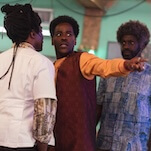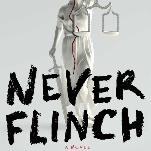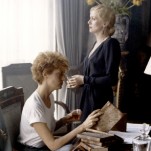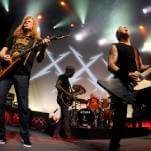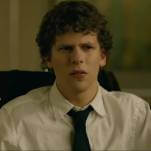Box Of Paperbacks Book Club: The Mouse That Roared by Leonard Wibberley (1955)
(Not long ago, A.V. Club editor Keith Phipps purchased a large box containing over 75 vintage science fiction, crime, and adventure paperbacks. He is reading all of them. This is book number 29.)
Let's start with a clip from the 1959 film adaptation of this week's selection, The Mouse That Roared:
That gag isn't in the book, and wouldn't work in book form. But I like it because it puts both in context. Leonard Wibberley's 1955 novel (and the film based on it) are the mildest of satires, but the climate that spawned them was anything but mild. Both versions took as their topic nothing less than Cold War politics, an arena with global stakes and potentially catastrophic consequences. In other words, the laughs could always be interrupted by the big ka-boom, though both versions are too generous in their visions of humanity to suggest that the big ka-boom could be anything but an accident.
Born in Ireland, educated in England, and drawn to America, Wibberley enjoyed an extremely prolific career writing children's fiction and non-fiction, in addition to novels for adults. But The Mouse That Roared remains his best-known work. Like Night Of The Living Dead or The Man Who Would Be King, its title has taken on a life of its own, even among those who don't know the source material. And these days, reading the book requires a trip to the library or a secondhand store, since it's out of print. I can't say that shocks me. It's a fun little book—possibly even, as the title claims, the screwiest book of its year—but not exactly the sort of satire that transcends its time.
The action opens in the Duchy Of Grand Fenwick, a few independent acres between Switzerland and France. (Though I imagine it as neighboring Fredonia, Latveria, and Genovia.) It's a country in crisis. Having depended for centuries on its chief export, the much-desired rare wine Pinot Grand Fenwick, it has its economy thrown into chaos by the introduction of Pinot Grand Enwick, a cheap American knock-off. This leads to the formation of two rival parties, the Dilutionists—those in favor of increasing profits by watering down the wine—and the Anti-Dilutionists. After first entertaining the idea of pretending to be flirting with communism, they choose another plan, courtesy of their beauteous young leader Duchess Gloriana XII—war. The logic here: After declaring war on America, they can enjoy the economic support traditionally extended to the country's defeated foes.
To that end, Gloriana inspires the already gung-ho Tully Bascomb to conquer America, backed up only by a handful of mail-clad men carrying longbows. To everyone's great surprise, he wins. Arriving in New York, he finds the city deserted, thanks to an air-raid drill that has sent the entire East Coast underground. Walking into the deserted city, he finds scientist and native Fenwickian Dr. Kokintz hard at work on the Quadium bomb, an ultra-destructive device whose creation inspired the air-raid drill in the first place. Returning to Grand Fenwick with scientist and bomb in tow, Bascomb ensures his nation's rapid ascent from backwater to superpower. (Although, in the book's best gag, it takes quite a while for America to realize that it has not only been invaded, but conquered.)


























